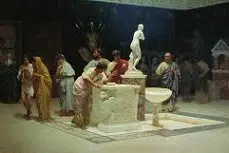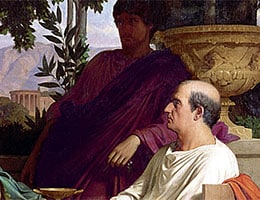 Several decades before Christ , the Roman emperor Augustus had an advisor who was also dedicated to promoting the arts : Gaius Maecenas . This man used to protect poets and creators and sponsor their activities.
Several decades before Christ , the Roman emperor Augustus had an advisor who was also dedicated to promoting the arts : Gaius Maecenas . This man used to protect poets and creators and sponsor their activities.
From this historical figure, the common noun "maecenas" emerged. This is the name given to the individual who financially supports artists and writers , facilitating the development of their work .
Patronage is the sponsorship granted to subjects dedicated to some creative or intellectual activity. The patron provides material sponsorship, although many times he also uses his influence or power to help.
In ancient times, the patron used to offer his collaboration directly and disinterestedly. His actions were linked to the satisfaction he experienced by promoting the creation of artistic works.
We must stop at the disinterest of the patrons, since in its purest definition they were those who supported the production of artists whose works were not oriented to the market, but rather to mere personal development and growth at a technical level.
Although today the idea we have of the Church is very different, in the Early Middle Ages it was almost the only institution that sponsored artists in general, exercising the role that we could equal to that of the patron. This is because it had an almost absolute monopoly on intellectual activities, and this translated into commissions from specialists in different fields to carry out various works .
The Early Middle Ages began in the 5th century and ended between the 9th and 10th, and brings together the history of the European continent and the Middle East. Already in the late Middle Ages, between the 14th and 15th centuries, patronage by individuals or institutions beyond the Church became increasingly common. Among the most frequent patrons were members of aristocratic families, some social and political institutions and certain authoritarian monarchies in full development.
Currently, patronage is usually developed through institutions . A millionaire, for example, may be in charge of financing the construction and operation of a museum dedicated to exhibiting paintings by young artists. The entity also grants scholarships and subsidies to painters. The magnate, therefore, assumes the role of patron.
There are other ways to play the role of patron, although in a less direct or specific way, such as the creation of foundations dedicated to exposing children to different artistic and professional disciplines to help them find their calling .
 Depending on the characteristics of our upbringing, not all of us discover our talents as children, but we often need someone from outside the family to guide us with their experience, and it is in these cases in which patronage with these characteristics is ideal.
Depending on the characteristics of our upbringing, not all of us discover our talents as children, but we often need someone from outside the family to guide us with their experience, and it is in these cases in which patronage with these characteristics is ideal.
Crowdfunding , on the other hand, is a donation system that takes place on the Internet . All people can contribute a small sum of money to make a project come true, thus acting as patrons.
Known in English as crowdfunding , crowdfunding goes beyond the artistic. It is possible to support athletes who need funds to compete or activists who want to carry out a campaign, to name two possibilities.
Although it is not common to use the term patron in this context to refer to the people who have collaborated with a certain project , technically we could say that that is their role. Typically, however, the press refers to them as "investors" as they have undoubtedly invested their money to support the creators.
